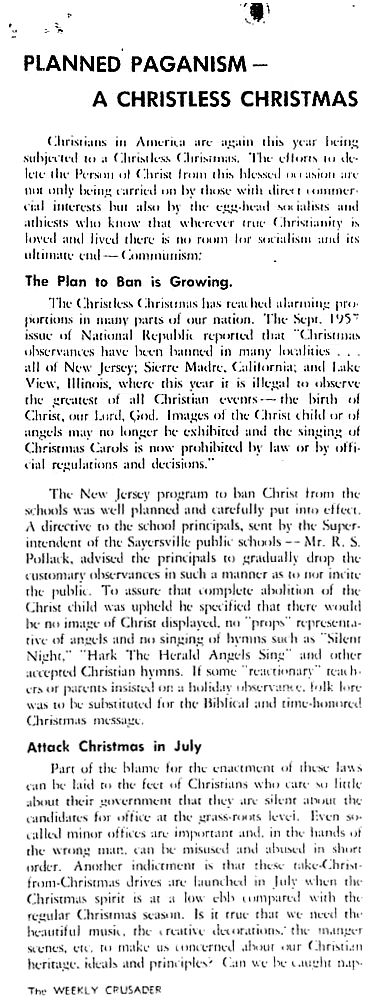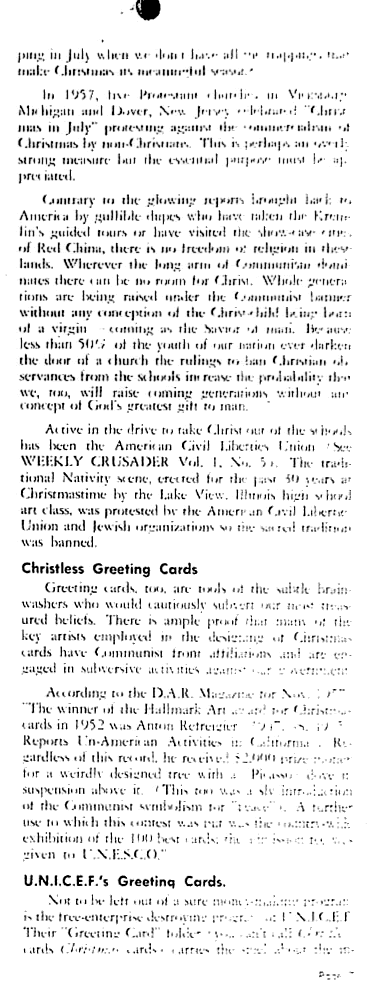The Religious Right's War on Christmas Began Centuries Ago
[please promote this post by voting it up on digg] As journalist Frederick Clarkson observes, proclamations from Bill O'Reilly, claiming the existence of a leftist assault on Christmas, are "part of a transcendent politics of the Religious Right, and a variant of that old time McCarthism -- baiting everyone with whom they disagree as advocating a 'godless' agenda." Indeed, Billy James Hargis' Christian Crusade was making the same charges back in 1960 and much earlier in the year -- in July in fact.
But how did the "War on Christmas", as a concept, originate ? As it happens, once upon a time there was a real "War on Christmas" and it was initiated by the theocratic Christian right of its day, Swiss Calvinists and Scottish Presbyterians. Here's a short overview:
The "war on Christmas" traces back, historically, to Calvinist bans on the celebration of Christmas which began in Geneva and then migrated, with the spread of Calvinist theological views, to Scotland, where Christmas was banned in 1583, a ban that remained in force four almoast four hundred years and was only lifted in the 1950's. As Amy McNeese writes, in an article, first published in the Church of Scotland magazine Life & Work,that may be one of the best treatments of the War on Christmas.
"For almost 400 years, Christmas was banned in Scotland. At the height of the Reformation, in 1583, when anything smacking of Catholicism and idolatrous excess was thrown out with contempt, Christmas and all its trappings was wiped off the official calendar...
...Reinforced by the hard arm of the law, this was a ban that had bite...
This was an age when religious belief could mean the difference between life and a very nasty death....
Scottish Presbyterians, when called on for support by the Puritans of the English Parliament in 1644, did so on the understanding that their allies would in exchange impose the ban on Christmas. For over a decade traditional English Christmas festivities were prohibited
From Scotland, the ban on Christmas spread south as Oliver Cromwell's New Model Army brought the Cromwellian revolution to England. Cromwell's Puritans banned Christmas in England for about a decade but the measure was unpopular. Feelings among pro and anti Christmas advocates ran strong and, after a second enforcement act against Christmas was passed by the English Parliament in 1647 [writes McNeese],
Again the people rebelled, this time so forcefully that armed officers had to be sent to remove evergreens decorating St Margaret's Church, near the English Parliament itself. Rioting broke out in London, Kent, Oxford, Canterbury and Ipswich, in which several people were killed. A petition with more than 10,000 signatures demanded either the restoration of Christmas or else the king back on the throne...
Even after the bans were revoked in England in 1660, Puritans and other Non-Conformists "ranted against Anti-Christ's-masse and those Masse-mongers and Papists who observe it", and were commonly known to "inveigh against New Year gifts and evergreens, or to attack the Pope by refusing to eat plum-broth; or to condemn those who ate mince-pies as Papists and idolaters"....
These attitudes were carried to the New World by English Puritans, Quakers, Baptists and Scottish Presbyterians. In America, reprisals were as harsh here as back in Scotland. In Massachusetts a five-shilling penalty was imposed on anyone found feasting or shirking work on Christmas Day...
A hundred years later the Quakers were still ranting against the Christmas pie as "an invention of the scarlet whore of Babylon, an hodge podge of superstition, Popery, the Devil and all his works".
From England the War on Christmas then crossed the Atlantic to the New World migrating with the Puritans who were fleeing the persecution of their political and theological tendency that followed the overthrow of Cromwellian government. Under Puritan rule in the Bay State Colony, Christmas was at one point legally banned for two decades.
Christmas fared worse in Scotland though and was only brought back after four centuries, in part due to the culinary experiences of Scottish soldiers during World War Two. As McNeese describes,
Abroad and in the company of English soldiers, many Scots experienced their first proper Christmas dinner. Once tasted, it was never forgotten. On their return home, these servicemen began to celebrate the festival with some style, and gradually their ideas took root.
Early in the 20th Century in America, the notion of a "war on Christmas", which had long been on the wane, got a boost, as Talk To Action contributor Chip Berlet demonstrates, in 1921 with Henry Ford's notorious and highly influential anti-Jewish tract "The International Jew".
By the America of the early 1960's, American Christian right groups such as Billy James Hargis' Christian Crusade, which was at least heavily Christian nationalist if not overtly theocratic, had appropriated the notion of a "war ion Christmas" as a means of red-baiting the American left ( see section, below ). But the true, historical War on Christmas was a creation of the Protestant, theocratic right.
According To Billy James Hargis' 1960 "Crusader" article [below], published during dark days leading up to the Cuban Missile Crisis, during which communism was held to be stealthily advancing via liberal Protestant churches and the machinations of Hallmark Greeting Cards and UNICEF, Christmas was also then under siege from the left. But in 1960, the religious right's war on the alleged war on Christmas got started much earlier in the season than is now customary.
In 1960, the war on the war on Christmas started in July.
Below: December 9, 1960 article from "The Crusader"



































No comments:
Post a Comment